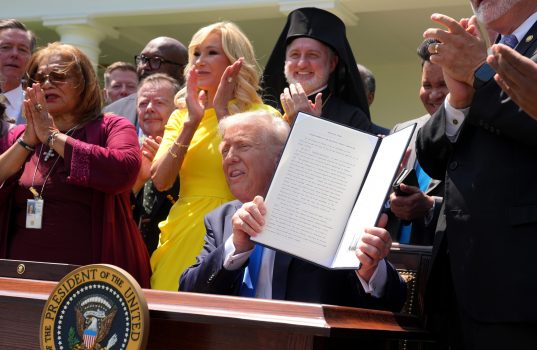
Today is the second meeting of President Donald Trump’s Religious Liberty Commission, again being held at the Museum of the Bible in Washington, D.C. As you may remember, at its first meeting, the commissioners heard a one-sided view of the history of religious liberty and the meaning of church-state separation. Today, the commission will look at religious liberty in public schools.
Today’s meeting will be another attempt to rewrite what religious freedom truly means. The commissioners will hear from parents and students who claim they are being “silenced” in public schools for expressing their beliefs. Participants will echo statements we’ve already heard from figures like Oklahoma State Superintendent of Public Instruction Ryan Walters, who insists the Bible must be mandated in public school classrooms. The Religious Liberty Commission may even hear rhetoric like that from an Arizona legislator who claimed “Jesus is a lot better than a psychologist,” framing religion as an appropriate substitute for licensed school counselors.
We expect that the Religious Liberty Commission and representatives of the organizations asked to speak will push this narrative that distorts history, stirs fear, and ignores the real threats to religious liberty in public education – all while continuing this administration’s quest for government-endorsed religion, specifically its approved form of Christianity.
This framing is dangerous. By portraying public schools as hostile, this administration is trying to justify policies that privilege one specific view of religion and marginalize anyone who doesn’t conform to those beliefs. That isn’t freedom; it’s exclusion. Left unchecked, their agenda would turn every public school into an arena for religious coercion.
Here’s the reality: The First Amendment already protects public school students’ religious freedom. As Americans United explained in comments we submitted to the commission, students can pray or otherwise engage with their faith as long as it’s voluntary, non-disruptive, and student-led. At the same time, public schools must protect the religious freedom of all students, which means students should never feel coerced by school employees or other students to participate in religion.
With more than 2,000 religious groups, traditions, and denominations represented in the U.S., it comes as no surprise that the Constitution requires “wholesome neutrality” when it comes to religion. This neutrality isn’t anti-religious – it’s the only way to protect religious freedom for everyone because no one should feel like an outsider in their own school.
The real danger to students’ and families’ religious freedom exists when policymakers and school officials impose their specific beliefs on children attending our public schools. In recent years, we’ve seen efforts to advance Christian Nationalism in public schools: mandated Ten Commandments displays, replacing counselors with school chaplains, and expanding “release time” programs that funnel students into religious education during the school day, among others. We hear stories about students who are proselytized and harassed by their teachers to the point of becoming physically sick every morning before school, forced to attend assemblies with altar calls, called names and told they are going to hell, and forced to pray with their coaches.
Mandating religion in schools doesn’t protect faith – it weaponizes it. These efforts undermine religious freedom by pressuring students to conform to one faith, whether or not they and their families believe it.
That’s why church-state separation matters – it prohibits religious coercion, ensuring classrooms remain places of learning that are welcoming of people of all faiths and none.
AU will continue pushing back against distortions and defending every student’s right to learn free from coercion because religious freedom for everyone means favoritism for no one. Follow AU for more updates and join us in protecting religious freedom for all.